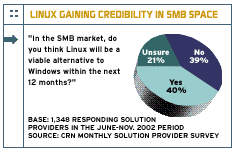IBM Breaks Tradition With P630 Linux-Only Midrange Server
Executives at the computer giant say the p630 will run the Linux operating system natively and will ship without AIX,the proprietary technology that helped fuel growth of the company's legacy RS/6000 line.
"The big news here is, for the first time, the availability of a Linux stand-alone offering without AIX," said Carl Freund, vice president of product marketing for the IBM pSeries. "We believe it opens up dramatic new opportunities for IBM in enhancing our leadership role in Linux."

\
The IBM p630 server, which will ship with the Red Hat or SuSe Linux operating system--but not with IBM's proprietary AIX--is aggressively priced at less than $17,000.
The servers, which are slated to ship with either the Red Hat or SuSe Linux operating system, are priced at less than $17,000. Aggressive pricing is another prong in IBM's new server strategy, which comes on the heels of several years of soft or declining market share.
Throughout the 1990s, IBM emphasized its AIX as a key selling point for the RS/6000 line and later, after rebranding, the pSeries. The company said it believed the robust nature of AIX,not to mention its installed base,made it a fixture on the midrange servers that targeted Unix-based solutions.
But over the past two to three years, as IBM's market share slipped, the company led the movement to bring Linux,with its open-standards-based, low-cost architecture,into the enterprise. Previously, the company made versions of its middleware DB2, WebSphere and Tivoli products available for free to Linux developers in an effort to kick-start IBM-based solutions on the OS platform.
"Our strategy on software is to provide customers with a choice," said Adalio Sanchez, general manager of IBM's pSeries unit. "[Users can run AIX applications natively, or they can run their Linux applications on pSeries natively. They can jump on AIX today and know they have the peace of mind that we will support them on Linux wherever and whenever they go [to Linux over time."
The move by IBM is likely to spark what could be a strong war of words with rivals such as Hewlett-Packard.
HP, in a statement responding to IBM's new Linux-based servers, criticized the p630 as being based on proprietary hardware and claimed that IBM was focusing only on a narrow offering when making price comparisons.

"HP's Itanium 2-based servers run three widely used operating systems,HP-UX, Windows and Linux," HP said, adding that "the p630 runs only Linux and Unix."
Sanchez declined to respond to HP's remarks but said there are currently no plans to port the server platform to Microsoft's Windows XP OS.
"It's adding sales," said Al Miller, vice president of Optimus Solutions, Norcross, Ga., an IBM business partner. "In effect, instead of making AIX as everybody's Unix %85 they've really made a complementary offering by enabling their hardware to run AIX or Linux.
"The customer has a choice," Miller said. "That's what it's really all about."
While the new offering could open some doors for IBM in the fast-growing SMB space, Miller said it should not be viewed as a "scaling-down" of technology to fit smaller installations.
"What it does do, though, is potentially offer lower-cost alternatives to the small- and midsize-business segment," Miller said. "It's the fastest-growing market segment. From that point, [the SMB market is taking off like hotcakes."
Miller noted, however, that the Linux offering's "acceptance into the enterprise data center will be slower."
"I think IBM has the right strategy [overall," he said. "It's a complementary play in the Unix world."
The new systems are based on IBM PowerPC processor technology,featuring a Power4 chip,and will be priced starting at $16,727. The systems are based on the company's aggressive new pricing strategy, under which some of the pSeries servers are priced lower than comparable servers based on Intel's Itanium 2 processors running Linux, IBM executives said.
IBM acknowledged that the pricing actions were taken in large part because of the market-share beating it had been taking from rivals such as Sun Microsystems and HP.
IBM's Freund said other technical advances designed to boost Linux are also forthcoming. Next year, IBM's server division plans to ship servers that offer dynamic partitioning as soon as the Linux community adopts the technology on the platform, he said.
IBM has partitioning capabilities in its proprietary operating systems, including the OS/400 and its mainframe technology, and has been working to bring much of that partitioning expertise to other platforms.